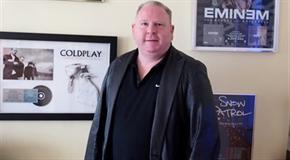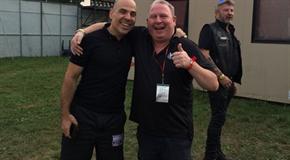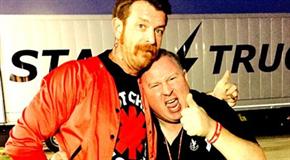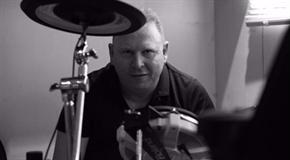Features
Executive Profile: Steve Strange, X-Ray Touring

He spoke about his job, the beginnings, the present and the future.
We also journeyed to his hometown near Belfast, Northern Ireland, and tried to get a bit personal. Of course, the current hot topics of the trade were also touched upon.
Strange was born an only child in Carrickfergus, Northern Ireland, a small town located 11 miles north of Belfast.
He grew up surrounded by bands, and started playing drums in Boys Brigade. He got his first drum kit when he was 12 years old and played in several bands throughout his youth and young adulthood. They mostly played heavy rock music, inspired by The Who, AC/DC and the like. Because that particular genre had yet to take off in Northern Ireland, one had to really dig deep to find gigs. Strange always enjoyed that part, and he learned a lot about the craft of agenting by default.
In the late 1980s he was playing in a band called No Hot Ashes, which garnered quite a following in Northern Ireland.
They signed a record deal with GWR, which was part of Pye, the label that had Motörhead, Hawkwind, Uriah Heep and many more at the time. But because of a series of unforeseen circumstances, their debut album was never properly released and the band scattered. One after the other, each band member moved back to Belfast. Strange tried to make it work, though.
After working on building sites for about a year, he got a job at a booking agency run by a man named Adam Parsons – the same man who now manages Thin Lizzy, Europe and more at Siren Artist Management in California. Both men remain close friends to this day. After about 10 months, Strange left Parsons’ company for Prestige International, which was then run by Miles Copeland, Phil Banfield and Rob Hallett.
He eventually moved back to Belfast because he couldn’t afford London. He worked for Irish promoter MCD for a while, where he promoted the nightclub Limelight. So by 1991, Strange had completed the live business’ holy trinity, and had seen it from all sides: the band’s, the agent’s and the promoter’s. He moved back to London in ’92, where Rob Challice gave him a job at Forward Agency Booking. When Strange’s bands, such as Ash and Placebo, started to explode, he knew he had to find a bigger place if he didn’t want to lose them.
John Giddings gave him the opportunity at Solo Agency. Strange stayed with Giddings, whom he calls a mentor, for about a year and a half and moved to Helter Skelter, which was then called Fair Warning/Wasted Talent. It was the biggest agency in the country at that point. It successfully operated for year until, in 2005, Strange left together with colleagues Ian Huffam and Jeff Craft to form their own agency, X-ray Touring.
See Also:
First of all, is Steve Strange your real name?
Yes, it is.
You grew up around Belfast. What was the live scene like there?
t’s very good. Many great artists have come out of Belfast over the last years, including Snow Patrol, Ash, Two Door Cinema Club and the like.
There’s a very vibrant scene with some really good, nice little venues to see bands in. MCD and Aiken Promotions have kept a great visibility on live music with the bigger acts and event such as [Tennent’s] Vital and Belsonic. There’s the Cathedral Quarter Festival; there’s a whole bunch of different events. For a small country, Northern Ireland has actually brought out some amazing talent over the years.
Amazing talent, whether that be Gary Moore or Van Morrison. Tell us how you promoted yourself, before becoming an agent.
I was working for Denis [Desmond] and Eamonn McCann at MCD and Wonderland, which were together at that time. I’d been promoting the Limelight; I was booking the place for just less than a year. I promoted quite a few sold-out shows in that period for serious acts such as The Cranberries and The Lemonheads.
During that period of time, I was dealing with agents a lot, and became quite friendly with other agents. I told Rob Challice that I was missing London, and he suggested having a chat about coming to work for him, which I did. I stayed there for the best part of two years. You went to John Giddings and Solo, then to what would become Helter Skelter. Why did you eventually leave? Jeff [Craft], Ian [Huffam] and myself sat together in one part of the building.
Both of them had been there for quite a long time, and our contracts were due to finish. I think they fancied a change and I became part of it. They were great colleagues and I shared their excitement of going out and starting something new.

X-ray has turned into one of the biggest agencies. How do you keep an eye out for new talent?
I get very excited about new artists. I love breaking artists; that’s one of the most enjoyable parts of this job. I’m no stranger to the clubs of this city.
Not at all. I see a lot of acts at the Lexington, The Black Heart in Camden, or the Barfly before it was closed and the Hoxton Square Bar & Kitchen; there’s whole bunch of places. I go to many shows. What do you look for in someone who works for you? I want to see people with vision. People that have got a very healthy belief and taste in music. All of the qualities that I think I would have had and still have.
A healthy passion for music, a good vision. I’m hungry and hard-working. I look for people who are not afraid to go and see two or three shows in an evening, take the bus home, get up and do exactly the same thing the next morning; who live and breathe their job.
That’s what I’ve done. That’s what most of the other successful people I’ve worked with have done, whether they are agents or managers. You have to have a good work ethic.
How has the agent’s profession changed over the years, and which development has affected it most?
I think it’s not so much our role that’s changed, but how the business has changed on a greater scale. With the introduction of the internet and social media, and decreasing album sales, record companies in general have wound down to a large degree. There’s not the same amount of money spent anymore because they can’t justify it by the return on investment. It makes it harder to break a group, because you don’t have the same infrastructures you used to have.
You have to do things in a very different way. Everything has become a lot more of a cottage industry in a way: people putting out their own releases, people working their own social media very hard.
Even though it is now harder to break a group, I think the live business is always going to be there. People will always want to forget about their shitty day. People will always want to be entertained. And music is the greatest deflection from the real world you can get. Whether you’ve had a crap week at work, or problems with your girlfriend, just going to a show can take all of that away. Music, and entertainment in general, will always be something people will want in their lives.
So, as agents, our role in the business has become a lot more pivotal. I don’t think labels, in the past, acknowledged the overall importance of what the live industry was. I’m not, by the way, having a go at labels here.
Labels were a lot more independent in their thinking and their strategies in the early days. But now a label sees the importance the role of an agent on the live plan plays in the growth rate of breaking groups these days.
Could we touch on a few of the current hot topics? First off: secondary ticketing.
I personally don’t like secondary ticketing. I would never advise one of my clients to go down that road. I think there’s so many of them these days, and, in fact, even companies like Ticketmaster have near enough their own secondary ticketing division as well. Business; it’s as simple as that. I think face value is the fairest way to go.
Could dynamically priced tickets be a solution?
It depends what you get for it. If your P1s at a Coldplay show are placed at a higher level than the pitch or the mid-to-back stands, you pay for the quality of the seats. Even if it’s a VIP package for Wembley, including a buffet before the show. There are various ways of scaling ticket pricing. I’m a very firm believer in careful scaling, and we’re very sensitive to the value people get for their tickets. With Coldplay, for example, we make sure to price the back seats as low as we can. We do this to stay attractive and competitive.
Are tickets in general becoming too expensive?

I think it comes back down to scaling again. In some cases, yes, tickets are very overpriced. You nearly need to sell your house to see Madonna these days! It’s ridiculous! But as long as people are still prepared to pay those prices, it’ll keep going up. I, personally, am very sensitive when it comes to ticket pricing. I personally don’t like to overcharge for an artist where possible.
Sometimes, unfortunately, you are pushed into a place where you have no choice. If an artist shows you that he needs X-amount of money to make his tour work, you have to charge enough to make X work. It’s not something I would do unless it was my final and only way to make a tour happen.
But, in general, no, tickets for my shows aren’t too expensive. It rarely happens, and we normally have sensible managers that understand the pricing structures and also don’t want to overprice themselves in the market and make themselves less competitive.
Second hot topic: venue closures in the UK.
I think it’s terrible. Unfortunately, it’s life in certain ways. The Astoria was threatened by closure for many years before it eventually got compulsory purchased, knocked down, and all for a bigger station for Tottenham Court Road.
The Astoria was one of the greatest black boxes in the world, you know? It was hot, sweaty, it wasn’t very well maintained in terms of its décor, but it had a real vibe, and a real character.
When that place went it was the end of an era. Whether it be The Joiners in South Hampton or The Fleece and Firkin in Bristol – these venues are iconic, historical venues, and all it takes is some arsehole developer to come up, buy a vacant property lot across the road and go to town with the council to try to close down the venue, because he wants a more attractive rent bill for his flat.
But, as I say, it’s life. It’s going to happen again and again, and you just have to keep fighting it.
PRS fees.
I don’t really have much of an opinion on that.
Brexit.
It certainly didn’t help. We’re only starting to really see it now, because a lot of the shows we already booked were pre-Brexit. The amount a U.S. band playing the UK was getting just dropped like a stone with the currency change. The pound against the dollar has fallen so badly. It hurts the promoters, who work with local currency as well. Their takeout when they exchange it over plummeted. International artists, in general, suffer quite badly from the Sterling depreciation.

Is there any continent you haven’t taken your bands to yet?
I have toured artists in most of them at this stage.
There’s certain countries, certain places in Africa that I haven’t toured acts in but, even by saying that, I’ve done three or four of the major markets of Africa over the years, mainly with the urban side of the business.
I’ve played most places in Asia, done shows in India and China, a lot in the Middle East. So, yeah, I think I’ve pretty much covered it. It’s something that just happens over the years.
Is there any band you always wanted but never got to work with?
Probably Pink Floyd! I’ve been a huge Pink Floyd fan for the past 30 years, maybe longer.
So is Pink Floyd your favorite band?
Pink Floyd or Led Zeppelin. And I would have loved to represent both in the day. I’m a big fan of authentic guitar music, you know. Whether it be The Who, whether it be Pink Floyd, Led Zeppelin or even the Stones. I love the Beatles as well. I love the fact they only were together for about eight or nine years, and look at the vast amount of legacy they left musically. How they reinvented themselves between 1962 and 1970 is just absolutely unfathomable.
How the fuck can you do that? It really is mindboggling. I think a lot of people forget that they only were together that short amount of time. Eight years is not an awful lot of time when you think about it. I’ve represented acts for the last 23 years, and they’re still under 40! It’s ridiculous.
Do you have a secret recipe?
It swings in roundabouts. There’s acts that I thought would have taken longer to break, and suddenly they just go through the roof. And there’s other acts that you really believed in, and you know that if there was justice in the world they would have been a lot bigger. Sometimes situations dictate why something doesn’t work.
Whether that’s signing to a bad record deal, or signing to a label where the A&R man gets fired the week before your album comes out. There are so many circumstances that can equate to a band’s misfortune and make them fall through the cracks.
What’s your favorite venue?
Now you got me. God. I have favorite venues in different ways. I love
And one of my favorite venues in the world is Ulster Hall in Belfast.
It’s a beautiful standing room; I have never seen a bad show there or experienced bad sound that I can remember. It’s just such a beautiful décor, and I have so many memories of me discovering music when I was growing up. I went to some very exciting shows in that venue, whether it be Motorhead, or whoever. I’ve seen so many shows in that tremendous venue over the years. But that’s probably more of a personal thing, because I obviously came from Belfast, and it just synthesizes everything that makes me the music fan that I am.
I felt like those bands were brought to that hall for me to hear. That meant a lot.
Favorite Festival?
Again, difficult. I’ve always loved Reading Festival. I’ve been every year, pretty much, for the past 25 to 30 years. It’s one of my favorites. I’ve always loved T in the Park and Roskilde. I think Rock Werchter is one of the best-run festivals of the world. Herman [Schueremans] has done an incredible job there. The backstage is beautiful, the toilets are immaculate, silver service catering; it just has so much class attached to it.
Favorite beer brand?
Becks works for me.
Favorite thing in the world?
Aside from my daughter, the ability to travel, and explore worldly cultures that I would have never been able to do if it hadn’t been for this job. It’s one of the many reasons why I love being an agent. You get a chance to open your mind and explore great cities, iconic cities throughout the world and get to appreciate how different they all are from each other.
Your favorite other agent?
I wouldn’t want to say that. That would get me in a lot of trouble! I’m good friends with a lot of them, they’re my peers and I get along with all of them.
From obviously the guys I work with presently to John Giddings, Rod MacSween to Neil Warnock to Emma Banks to Barry Dickins to a lot of those guys. I respect all of them for what they’ve built for themselves.
Is there anything that scares you?
Is there anything that scares me? Hmm. I suppose the state of the world leaders at present. I guess what scares everyone to a degree is not knowing what lies ahead of you. Death scares me, as it does everyone.
I guess if that is the only thing, you’re living a pretty fearless life.
I think you have to live life to the fullest, mate, and sometimes, you have to challenge yourself.

What do you do to unwind?
I watch MasterChef USA! I watch Gordon Ramsay shout at people instead of me!
What does the future of your business look like?
Things evolve naturally. Musical trends shift like the tide. It may be EDM one day and disco the other. If you look at music throughout the years, and some of the different scenes, you see it all changes and evolves.
I hope that rock music, guitar music, regains its foothold in the future. I think it’s lost a bit of its momentum through the changing trends, like EDM for example.
I hope that guitar music stays strong and vibrant forever. It think that’s down to the fact that I’m a musician myself.
There’s something that you cannot create on a computer, and it’s called natural rhythm and natural groove.
You cannot invent that. You can program something in your computer, you can have a drum machine and all sorts of different devices, but you’ll always hear it’s not natural. Nothing beats a great rhythm section playing together because there’s something very human and natural about it.
I’m a big fan of bands that can play. Call me old-fashioned, but that’s what I love.
Do you still find the time to play the drums at all?
Yeah, it’s one of my hobbies. I enjoy playing the drums. We played a few shows recently. But they are for enjoyment. I don’t let it affect my day job, because it comes first every time.
But just as some people like to play golf on a Saturday, I may go and play drums with a bunch of friends.
What advice would you give up and coming agents who want to enter the game?
Work hard and be honest. Believe in your own instincts, and use those instincts. And enjoy the gift that God gave us in music.